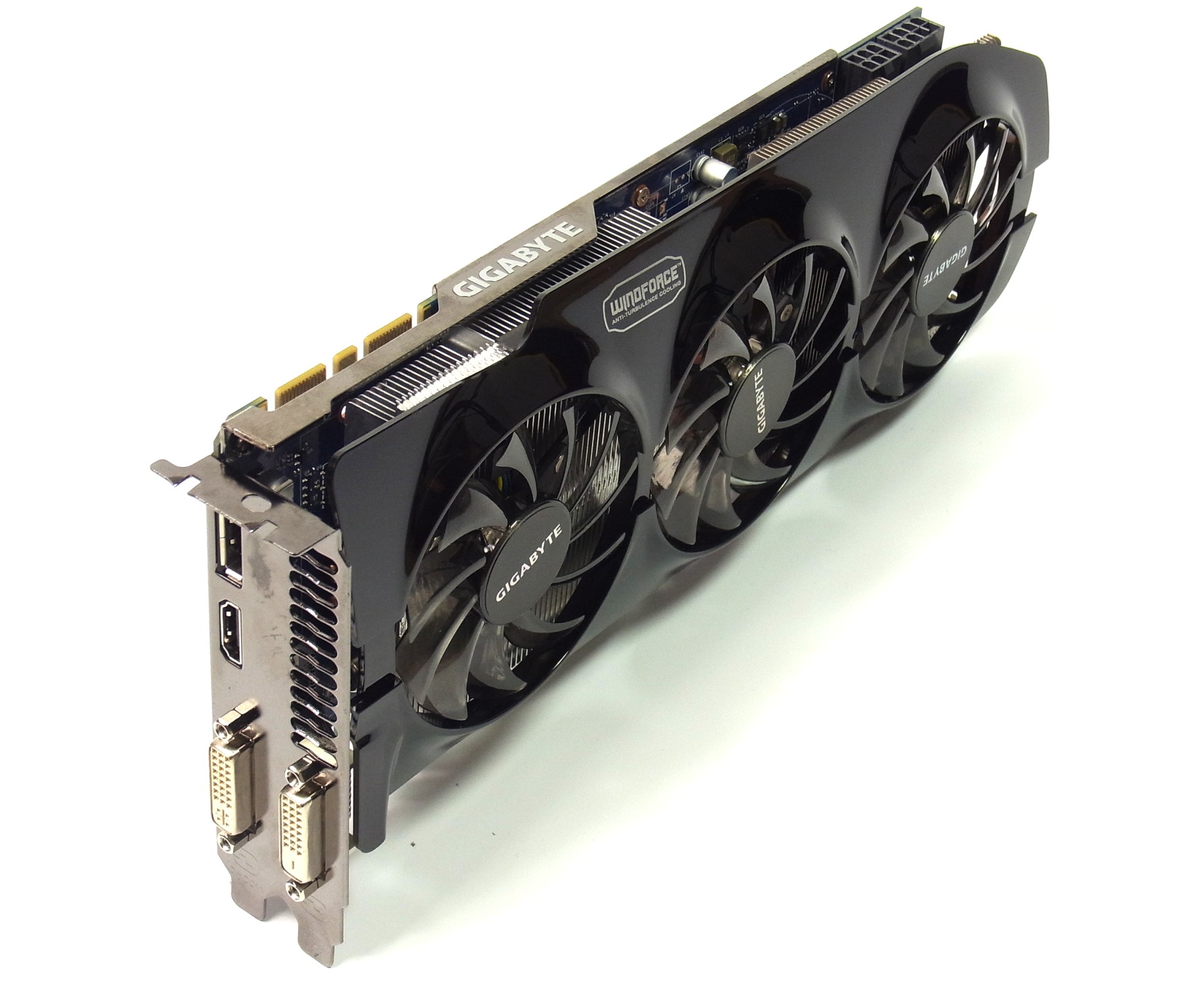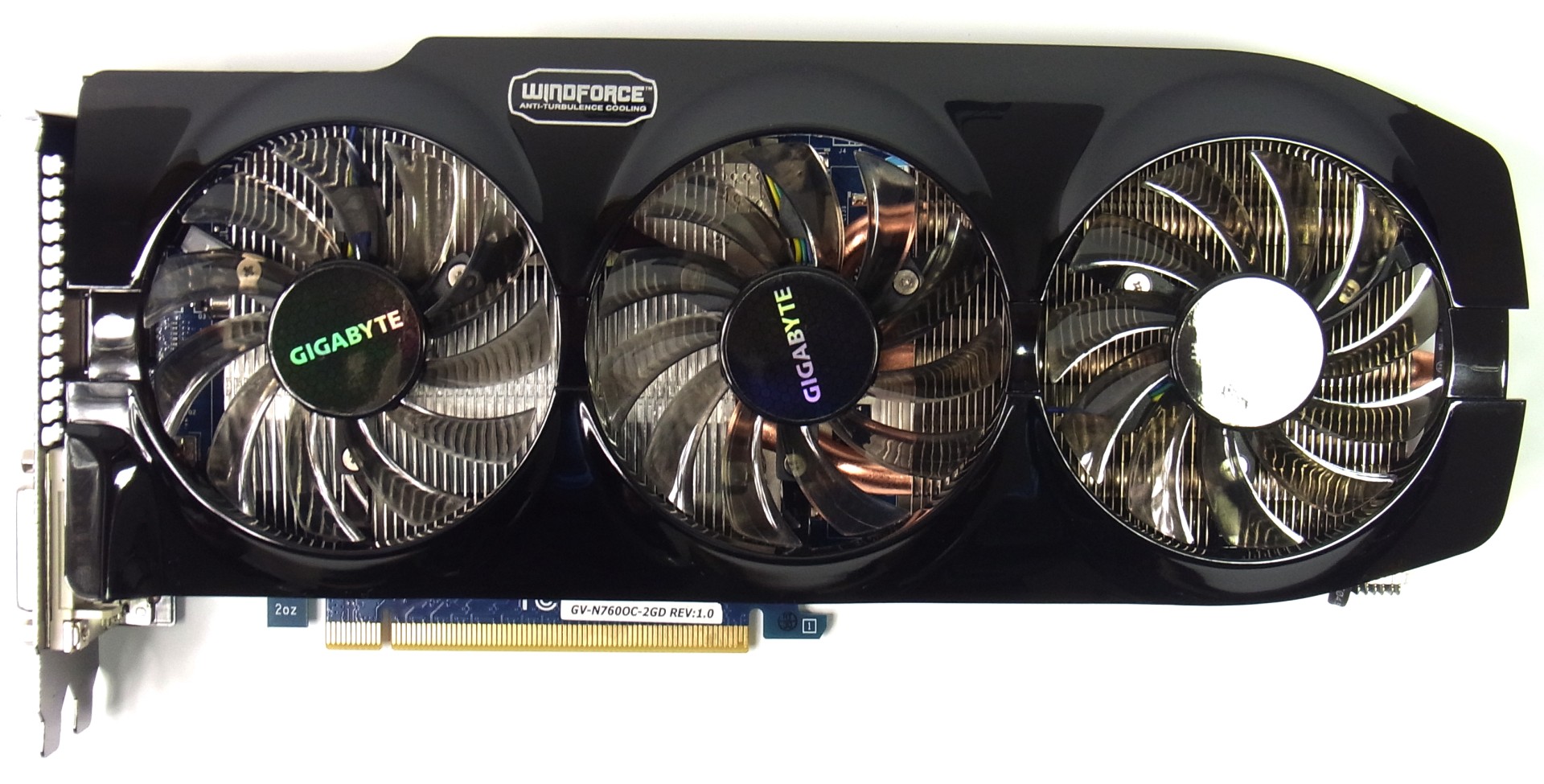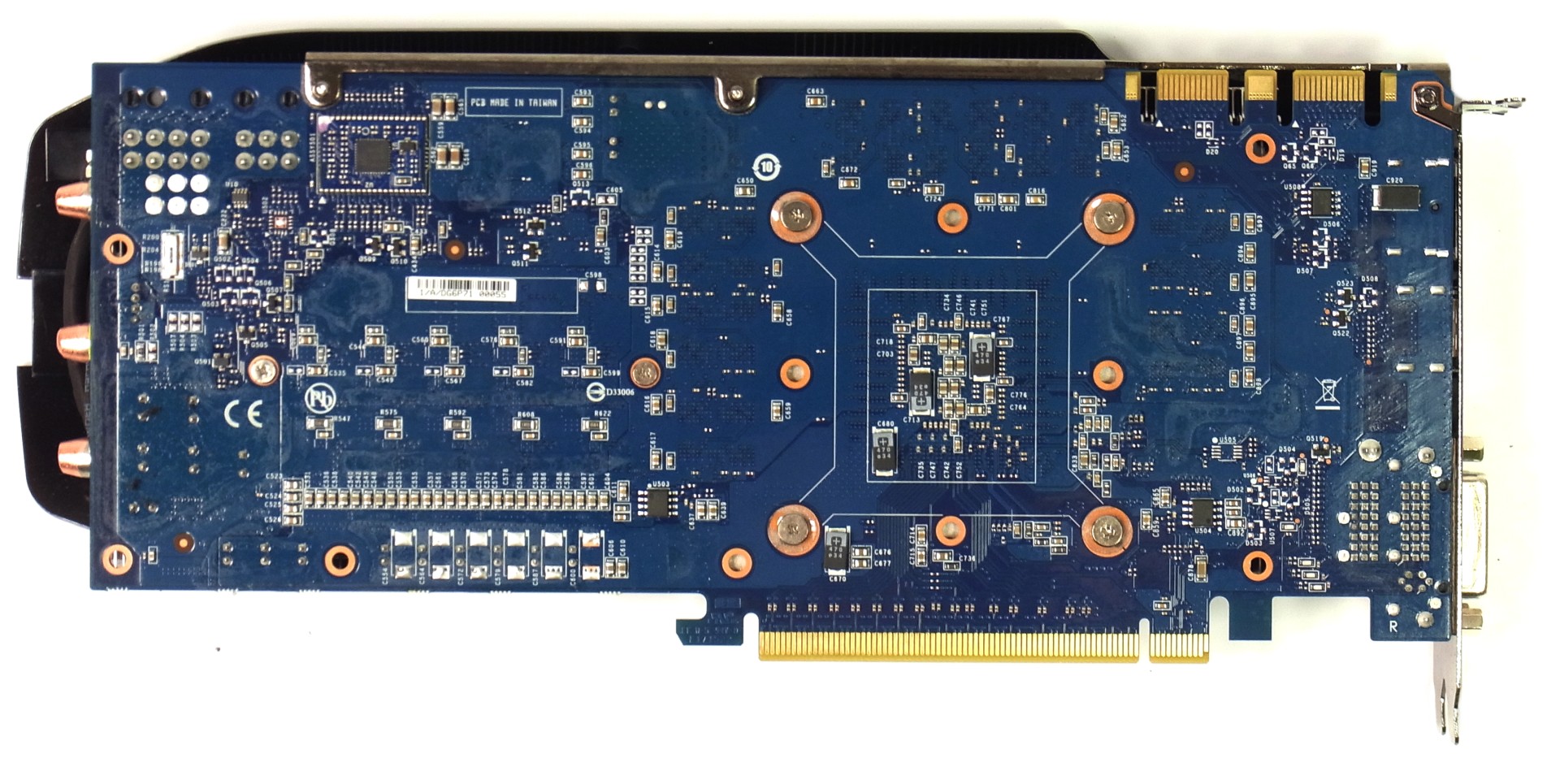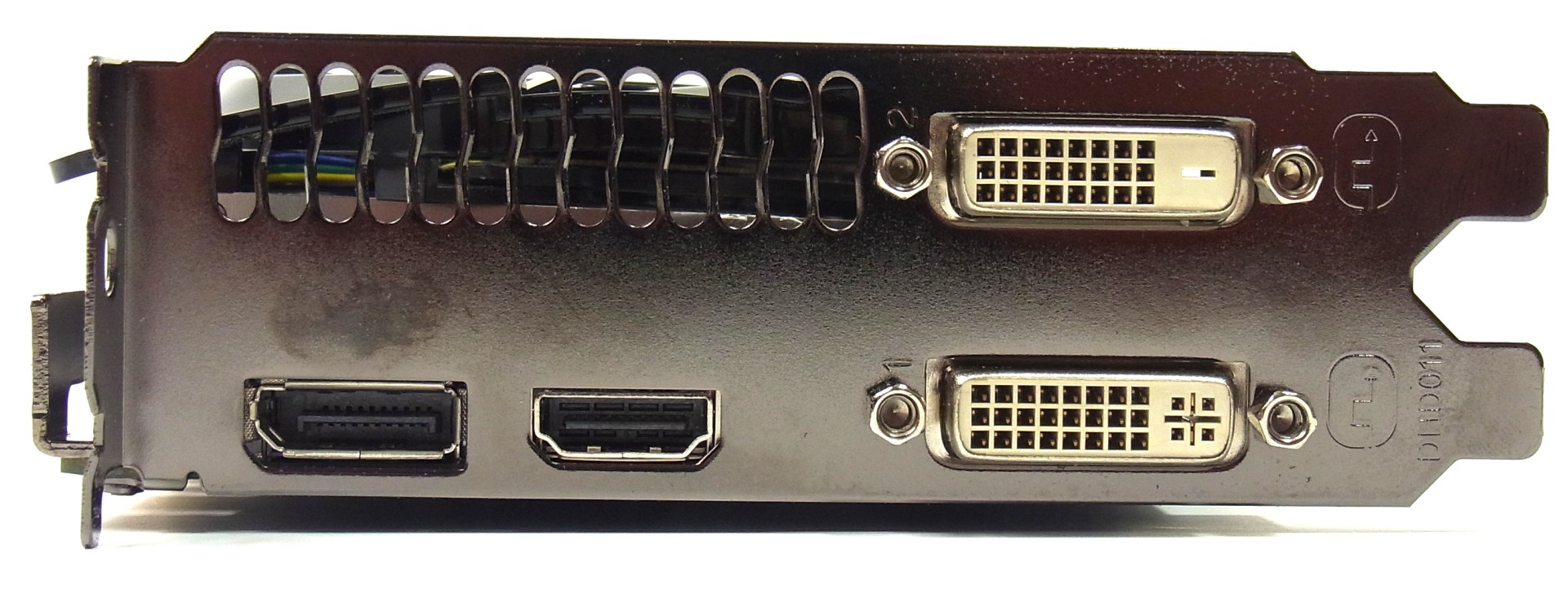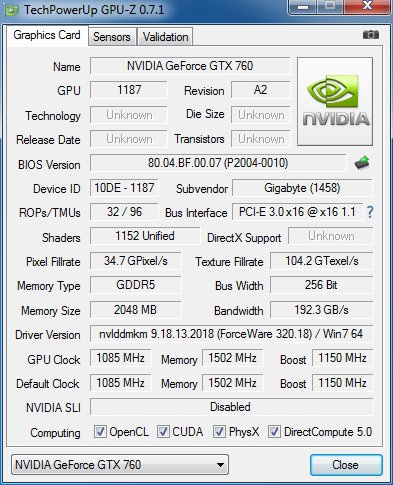GeForce GTX 760 Review: GK104 Shows Up (And Off) At $250
With its last graphics card introduction until the end of Fall, Nvidia isn't trying to impress anyone with groundbreaking performance. Rather, the company is pulling better-than GeForce GTX 660 Ti-class frame rates to a $250 price point, creating value.
Gigabyte GTX 760 OC Windforce
Does this card look familiar? Sporting the same Windforce 3x cooler as Gigabyte’s GeForce GTX 680 and 670, it also utilizes the same PCB. As our noise and heat measurements will show, that wasn't a bad decision at all. Additionally, this is the fastest factory-overclocked card in our armada of samples, boasting a 1085 MHz base clock rate. Thanks to a comparatively slim two-slot design, it is also a good choice for SLI configurations, even without a vacant PCIe slot between the cards. Because Gigabyte's design doesn't occupy a full two slots of width, the Windforce 3x cooler has enough room to breathe.
| Technical Specifications And Dimensions | |
|---|---|
| GPU Clock | 1085 MHz |
| Boost (according to BIOS) | 1150 MHz |
| Attainable Maximum Boost Under Load | 1228 MHz |
| Height | 125 mm / 4.92 inches |
| Length | 278 mm / 10.94 inches |
| Width (Cooler Side) | 36 mm / 1.42 inches (<= double-slot) |
| Width (PCB side) | 4 mm / 0.16 inches (no backplate, frame only) |
| max. Weight | 825 g / 29.1 ounces |
| Fans | 3 x 75 mm / 2.95 inches (fan diameter) |
As mentioned, the cooler is a familiar face and not especially heavy. Still, it is easily up to the task of keeping the card cool at all times. Whether or not you like the vertical arrangement of cooling fins is a matter of personal taste, but the configuration works well in enclosures without much room between add-in boards and drive bays.
The obvious downside is that half of its waste heat is blown down onto the motherboard, while the other half gets vented back into your case. Gigabyte's plastic shroud surrounding the three 75 mm fans may lack the visual finesse of some competing solutions, but does help keep the card's overall weight down.
Up top you find one 8- and one 6-pin power connector, as well as two SLI bridges.
Three 8 mm-thick copper heat pipes draw thermal energy away from the GPU and into a bifid cooler, while RAM and VRMs are covered by their own heat sinks connected to the main cooler as well.
Connectivity mirrors that of the reference card; Gigabyte exposes one dual-link DVI-I and one dual-link DVI-D port, in addition to HDMI and DisplayPort outputs.
Get Tom's Hardware's best news and in-depth reviews, straight to your inbox.
Current page: Gigabyte GTX 760 OC Windforce
Prev Page Nvidia Fires Off One Last 700-Series Card For The Summer Next Page MSI GTX 760 OC Gaming-
SiliconWars This doesn't look faster than the 7950 boost to me. Maybe you should check your scores and update your conclusion to reflect reality?Reply -
pauldh Reply11035777 said:This doesn't look faster than the 7950 boost to me. Maybe you should check your scores and update your conclusion to reflect reality?
Re-read the conclusion in question below. He doesn't say it is faster, he says this card will replace Don's recommendation for best $250 card and displace the 7950 Boost. ie. Don won't be recommending a $300 card that trades blows or barely beats a $250 card. If both were to end up $250, things change.
quote - "A quick reference to Best Graphics Cards For The Money: June 2013 shows that Don is currently recommending the Tahiti-based Radeon HD 7870 for $250. With almost certainty, the GeForce GTX 760 will take that honor next month, displacing the Radeon HD 7950 with Boost at $300 in the process." -
mapesdhs Chris, what is it about the GTX 580 that makes it so slow for the CUDA FluidmarkReply
test, given it does so well for the other CUDA tests, especially iRay and Blender?
Btw, I don't suppose you could include 580 SLI results for the game tests? ;)
Or do you have just the one 580?
My only gripe with the 760 is the misuse of a model number which allows one to
infer it should be quicker than older cards with 'lesser' names (660, etc.) when
infact it's often slower. I really wish NVIDIA would stop releasing products that
exhibit such enormous performance overlap. Given the evolutionary nature of
GPUs, and the time that has passed since the 600s launched, one might
reasonably expect a 760 to beat the 670 too, but it never does. To me, the
price drop is the only thing it has going for it. The endless meddling with shader
numbers, clocks, bus width, etc., creates an utter muddle of performance
response depending on the game. One really has to judge based on the
individual game rather than any general product description or spec summary.
I just hope Skyrim players with 660s don't upgrade on the assumption newer
model names mean better performance, but I expect some will.
Ian.
-
tomfreak GTX760 is an upgrade for GTX460/560 user and of all of that u didnt throw in those cards to bench with. Seriously?Reply -
Novuake Nice review as per usual Chris.Reply
Amazing performance at 250$. The 265bit memory interface does wonders for GK104.
Now I am wondering if there will even be a GTX760ti, while there is a large enough gap in the product stack, I have a feeling there is a chance there may not be a "ti" version.
Anyone know more? -
sarinaide AMD will have to release a new interim Radeon series, the existing family is not to outdated to be stretched to much longer.Reply -
horaciopz So, maybe there will be an GTX 760 ti, for about 300 bucks with the peformance of a GTX 670... Uh? nVidia really should. This remembers the gtx 400 series and 500 series... nVidia is doing it all over again.Reply
